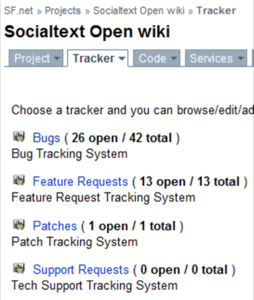Recently, we’ve seen a couple of our favorite web apps go open source. The code for FF To Go, the popular mobile client for FriendFeed developed by RSSMeme creator Benjamin Golub, is now available under the MIT license and Snackr, the RSS AIR app we adore has posted their source code on Google Code. Is this the start of a new trend for niche web apps? And what does this mean for the future of their development?

Why Go Open Source?
Of course, we can’t talk about the trend in open sourcing web apps without mentioning the big news about Reddit. Recently, the social news site decided to open up so that you can now build your own version of Reddit. The difference here is that Reddit is large enough to not be considered “niche” – it has 4.5 million unique visitors per month and has grown 1000% since the acquisition by Conde Nast’s Wired Digital division.

However, when compared to competitors like Digg and Yahoo Buzz, it’s clear that Reddit is the underdog here. If anything, the decision to go open source was a move to compete in a way that Digg and Yahoo cannot. When speaking as to what they hope to accomplish by the move to open source, co-founder Steve Huffman said that they’re hoping users will tweak what they want changed and add new features. The beauty in this is that even if users develop new features, they can’t necessarily be used to go and build a competitor to Reddit – because the code is open source, Reddit could just implement those features themselves.
Small Apps Open Up
While open source might be a good thing for a community the size of Reddit, there’s still concern that when smaller web apps go this way, it means the development cycle is going to slow down.

Take for example, Enso, an app which provides an alternative way to interact with your computer, similar to what Launchy offers. In March of this year, this niche app also went the open source route via the revised BSD license. In this case, the move was most likely due to the fact that the Mozilla Foundation hired away three of the principals from Humanized, the company behind both Enso and Songza. But immediately upon the announcement of the move, there was concern echoing in the comments of the blog post:
Will the Humanized folks still be leading the charge on Enso? or are leaving it adrift?
Humanized, please don’t leave Enso adrift.
As to whether Enso has indeed been set adrift…well, no one from the Humanized team ever responded in the comments section and the Humanized blog is now promoting Mozilla. A May 6th entry even let everyone know Mozilla was hiring and provided an email address to apply. In addition, four other of the May blog posts were about Firefox.
When it comes to FFtoGo, though, creator Golub assured me on Twitter that he’s still developing the app, but he hopes others will start sending him patches soon. (We hope so, too!) Snackr also is currently going strong, but they only went open source on June 5th. Still, they’ve already posted a couple of test builds on Google Code, which implement new features like the ability to star new items, change ticker transparency, customize how old the items displayed can be, and more.

Even Bigger Apps Can Lose Momentum
However, the concern for the lack of development isn’t entirely unfounded. Take for example, another open sourced app, this one from Socialtext, maker business social software. In July of 2006, they released Socialtext Open, an open source version of their wiki software. But it’s a good thing they didn’t stop development of their own because, by the looks of it, Socialtext Open has only had one patch in 2 years:

Excited or Worried?
Those are just a handful of examples of apps going open source, but there are many more. Of course, this isn’t to ignore the fact that Sourceforge does quite well, it’s just to raise the question – does open sourcing a niche web app really encourage more development? When the community is so small, if the creator doesn’t continue to work on the app, how does the app really fare? And has a favorite app of yours ever been abandoned?
Photo Credit: Free Beer by Henri Moltke

















